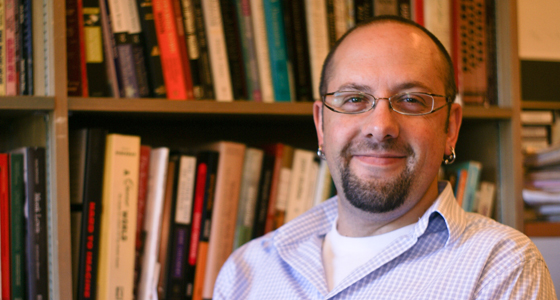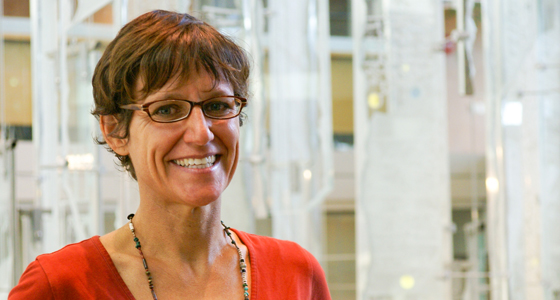In Aboriginal Initiatives at the Centre of Teaching, Learning and Technology, we have the pleasure of collaborating with faculty in an array of disciplines to support student learning regarding Indigenous topics and issues. Many of them share their teaching experiences and tactics by designing and facilitating a Classroom Climate series workshop. These workshops provide faculty, TAs, researchers, and staff with the opportunity to discuss challenges and opportunities that accompany conversations with Indigenous content. Addressing the fact that most students enter university with a lack of critical exposure to and understanding of Indigenous issues, Dr. Daniel Heath Justice and Dr. Lisa Nathan led a highly engaging session called Bridging the Knowledge Gap: Indigenous Foundations. During this interactive workshop, they guided participants through creative teaching activities, and demonstrated unique ways of engaging students with the Indigenous Foundations web resource.
Daniel Heath Justice is new to the UBC community as both the Chair of the First Nations Studies Program and an Associate Professor of First Nations Studies and English. Lisa Nathan is an Assistant Professor at the UBC School of Library, Archival and Information Studies (now known as the iSchool@UBC), and the Coordinator for the School’s First Nations Curriculum Concentration. Earlier this term, they introduced their roles and shared why they believe the Classroom Climate series is highly worth attending as part of your professional development.
Q: Can you please introduce yourself and briefly discuss your role at the university, area of research, and courses you teach?
 Daniel Justice (DJ): I’m a Colorado-born Canadian citizen of the Cherokee Nation, and associate professor of First Nations Studies and English at UBC. My research and teaching focus primarily on Indigenous literary expression and cultural studies, with particular emphasis on kinship and nationhood in Indigenous literatures, queer/two-spirit writings, and Indigenous speculative fiction. My teaching at UBC is thus far focused on our introductory First Nations Studies course and our fourth-year research practicum.
Daniel Justice (DJ): I’m a Colorado-born Canadian citizen of the Cherokee Nation, and associate professor of First Nations Studies and English at UBC. My research and teaching focus primarily on Indigenous literary expression and cultural studies, with particular emphasis on kinship and nationhood in Indigenous literatures, queer/two-spirit writings, and Indigenous speculative fiction. My teaching at UBC is thus far focused on our introductory First Nations Studies course and our fourth-year research practicum.
Lisa Nathan (LN): I am an Assistant Professor at the iSchool@UBC. As of 2010, I also serve as the Coordinator for the School’s First Nations Curriculum Concentration. My research and teaching areas include information ethics, design, and information policy. My work focuses on the intersections of ethics, design, information systems, and information practice.
Q: What are some of the challenges you face teaching?
DJ: Perhaps the biggest challenge is simply dealing with misinformation and a lack of accurate information about Indigenous peoples in the U.S. and Canada. When you’re dealing with such an absence of knowledge, it means that there’s often a very steep learning curve, one that can be complicated with emotional responses based on stereotypes in popular culture.
 LN: The subject areas that I teach rarely offer definitive answers and are filled with complicated and nuanced tensions, in large part because of our nascent engagements with digital technologies. At times students expect me to provide “the answer,” because the space of uncertainty can be rather uncomfortable. For example, when we discuss the relationship between identity and classification systems in a classroom full of future information professionals, students are faced with the potentially destructive powers that go along with classifying objects, ideas, and peoples. The challenge is figuring out ways to help students get past the idea that I will be handing them “bricks” of information that provide them with definitive answers.
LN: The subject areas that I teach rarely offer definitive answers and are filled with complicated and nuanced tensions, in large part because of our nascent engagements with digital technologies. At times students expect me to provide “the answer,” because the space of uncertainty can be rather uncomfortable. For example, when we discuss the relationship between identity and classification systems in a classroom full of future information professionals, students are faced with the potentially destructive powers that go along with classifying objects, ideas, and peoples. The challenge is figuring out ways to help students get past the idea that I will be handing them “bricks” of information that provide them with definitive answers.
Q: Why do you think it is important for TA’s, researchers, faculty, and staff to attend this series?
DJ: A full and humane higher education requires critical understanding of more than the triumphalist Canadian narrative of benevolent multiculturalism. Our shared present and past are far richer, more complex, and more challenging than is generally assumed, and the only way to ensure that our future is one in which we all have an honoured place of respect and dignity is to learn more about one another, our differences, and our connections. To do otherwise is to abandon the principles of justice, fairness, and respect that undergird the best of who we are and can be.
LN: Many may feel that they simply don’t have time in their day or perhaps that this topic doesn’t apply to the work that they do, the courses they teach. Whether you choose to attend this series or not, you are playing a part in Indigenous Settler histories, present and future. If you come to the session, your actions (or non actions) will at least be better informed. Plus – you will meet interesting individuals, have tasty snacks and learn about the invaluable resources available on the UBC campus.
Q: What do you hope this series will do?
DJ: I hope the series offers participants the best resources to make positive changes in their disciplines, classrooms, and lives.
LN: Inform the discourse, research, and teaching on campus to the point that Indigenous initiatives are no longer seen as a specialized area reserved for certain individuals. Rather, all of us have much to learn and contribute.
This article was published in the November 2012 CTLT Newsletter, Dialogues. Below is a list of the articles included in the issue:
- Faculty Spotlight: Daniel Heath Justice and Lisa Nathan (currently viewing)
- Peer Review of Teaching: What’s in it for Me?
- Communities of Practice at UBC
- New Teaching and Learning Resources
- Other Professional Development Events at UBC
Find out more information about the CTLT Newsletter, Dialogues.
Comments are closed, but trackbacks and pingbacks are open.